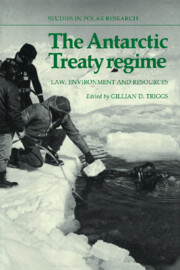Book contents
- Frontmatter
- Contents
- List of contributors
- List of Antarctic Treaty Parties
- Foreword
- Introduction
- Frontispiece: Map of national claims
- Part I Antarctica: physical environment and scientific research
- 1 Introduction
- 2 The Antarctic physical environment
- 3 Scientific opportunities in the Antarctic
- Part II The Antarctic Treaty regime: legal issues
- Part III The Antarctic Treaty regime: protecting the marine environment
- Part IV The Antarctic Treaty regime: minerals regulation
- Part V Whither Antarctica? Future policies
- Part VI Conclusion
- Selected reading
- Appendix 1
- Appendix 2
1 - Introduction
Published online by Cambridge University Press: 20 January 2010
- Frontmatter
- Contents
- List of contributors
- List of Antarctic Treaty Parties
- Foreword
- Introduction
- Frontispiece: Map of national claims
- Part I Antarctica: physical environment and scientific research
- 1 Introduction
- 2 The Antarctic physical environment
- 3 Scientific opportunities in the Antarctic
- Part II The Antarctic Treaty regime: legal issues
- Part III The Antarctic Treaty regime: protecting the marine environment
- Part IV The Antarctic Treaty regime: minerals regulation
- Part V Whither Antarctica? Future policies
- Part VI Conclusion
- Selected reading
- Appendix 1
- Appendix 2
Summary
Antarctica is the coldest, windiest and most inhospitable continent in the world, which differs from the Arctic in being a land-based continent and in having no indigenous population. Dr Phillip Law describes Antarctic activities as occurring during four periods: the trading, imperialist, scientific and resource eras ((1985) 10 (4) Interdisciplinary Science Review, 336–8). International interest in Antarctica began with commercial whaling and sealing expeditions through the eighteenth and nineteenth centuries. This trading era was followed by an imperialist era from 1890 to the 1940s which was a period of high adventure, heroism and colonial territorial aggrandisement, though predominately of a marine nature. Expeditions during this period were amateur and were engaged in preliminary scientific work collecting, describing and classifying information. It was not until the International Geophysical Year (IGY) of 1957–8 that scientific interests were generated in earnest. During the IGY, 50 stations were set up over the Antarctic continent and comprehensive scientific work was undertaken. Research during the IGY was subsequently maintained through a permanent committee of the International Council of Scientific Unions (ICSU), the Special Committee on Antarctic Research (SCAR). One of the dominating forces for the negotiation of the Antarctic Treaty in 1959 was to ensure that territorial claims should not retard comprehensive scientific research. With this objective, the Parties agreed that:
freedom of scientific investigation in Antarctica and co-operation toward that end, as applied during the International Geophysical Year, shall continue.
It was further agreed that all information regarding scientific programmes in Antarctica should be exchanged, that scientific personnel should be exchanged between expeditions and stations and that scientific observa-tions and results should be exchanged and made freely available.
- Type
- Chapter
- Information
- The Antarctic Treaty RegimeLaw, Environment and Resources, pp. 3 - 5Publisher: Cambridge University PressPrint publication year: 1987



